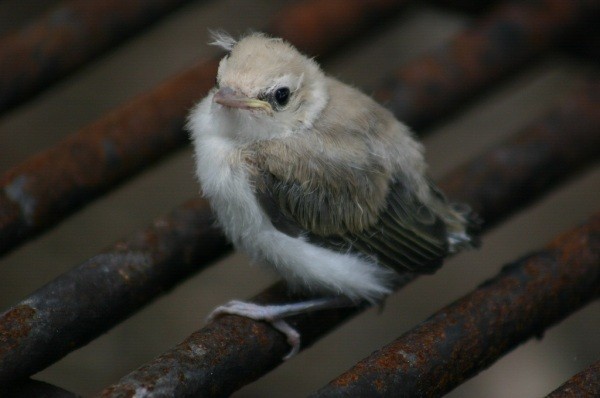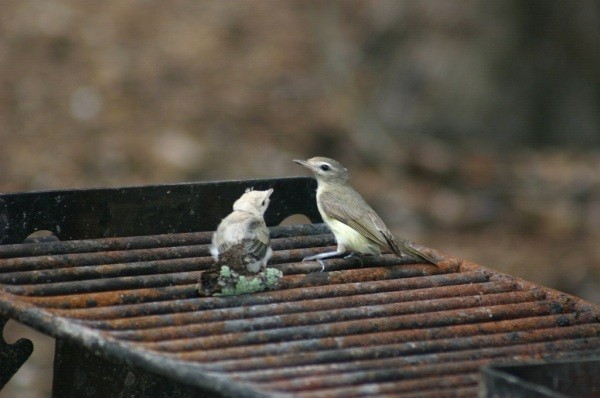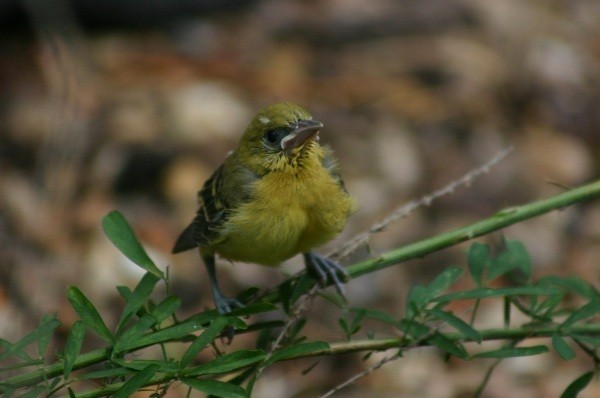During the summer, one can often find baby birds sitting or hopping along on the ground. Often, people assume that these babies have "fallen out of the nest" and are in need of human help. People will catch these birds and usually try to give them worms or bread (the wrong food for most young birds) and unfortunately most of these captured babies will die of shock, aspiration from being force fed or given water, or malnutrition from improper feeding. This is a sad situation, heartbreaking for children involved, and should not have ever happened in most cases.
When one finds a young bird on or near the ground, the great overwhelming majority of the time these are young birds which have just "fledged" and they are now being cared for by their parents as they are learning to fly. Most people picture a baby bird growing and stretching its wings in its nest until one day it just flies away as a grown up bird. But in reality, a baby bird does not spend many days at all in its nest, only the very earliest days of its life in which it is truly helpless. As soon as most baby birds are mobile enough to hop and cling to limbs, they will leave the nest, which has often become infested with parasites and which is now much too small for the rapidly growing birds.
It is a myth that if a baby bird is touched, that its parents will "abandon it." Songbirds have no appreciable sense of smell. But there is still no good reason to handle baby birds either in a nest or those which can be found on the ground, unless they are in imminent and unavoidable danger. Birds can easily die just from stress or shock.
So if you find a baby bird in your yard, what should you do? If the bird has any feathers at all, it is probably a fledgling and just doing what it has been designed to do... it has left the nest at the proper time. Try to keep your dogs, cats, and curious children away. If the baby is in a high traffic area, such as a sidewalk or street and is in danger of being trampled or captured by animals or children, toss a light cloth over it to catch it and gently place it in a more secluded spot nearby, preferably in a bush or shrub to offer cover. Then move away. The closer you are to the bird, the more likely it is that the parents will hesitate to come near, but be assured that they are probably watching quietly from a distance. Or, in some species the parents may squawk and scold or perhaps even attack you. The closer you remain to the fledgling, the more likely it is that the parents will hesitate to return to it. After all, they don't want to attract your attention to their baby. Parents are incredibly observant and will likely see you even if you attempt to hide nearby. Leave the area and let the parents do their job.
Even though these babies may not yet be able to fly, they can usually hop and climb well. Your continued presence nearby may cause the baby to panic and flee into an unsafe area which may leave it exposed to predators.
As adorable as baby birds are with their large eyes and fluffy feathers, we must resist the urge to handle them or keep them as pets. We are not suited to care for them as their parents are. Also, many people are not aware that in the United States and many other nations it is illegal to have a baby songbird in your possession, or even to keep any part of a bird, its eggs, or its nest. These laws are in place partially to protect birds from well-meaning but uninformed individuals who just want to "help" but who may end up doing harm.
The photos I have shared here are of some fledglings that we found recently at a campground. The white baby is a newly fledged Warbling Vireo. It was on the ground, but then hopped up to perch on a campfire grill. At first appearance, it seemed alone and abandoned, a tempting target for someone to "help" it by capturing it. But in reality it was being fed insects every few minutes by a parent.

The yellow bird is a baby Orchard Oriole which we saw nearby and which was also being tended by its parents. The Oriole baby alternated between sitting on the ground and climbing on weed stems. Its parents saw us nearby and scolded us, so we moved away. (I used a long lens to take these photos.)
These baby birds are undergoing a learning process necessary for their survival, and it is not our place to interfere with that, no matter how appealing and adorably cute they may be. A well-meaning and good-hearted but uninformed person who might have captured these babies would have almost certainly caused their deaths.
Newly-hatched birds are something else altogether, but are much less often found. I may address that some other time in a different posting.
Source: Years of experience observing and learning about birds.
By Shawna from TN, USA
Add your voice! Click below to comment. ThriftyFun is powered by your wisdom!
This is very good to know, kudos to you for putting your knowledge out there! The pics of the baby birds are so cute! I am a fan of bird, thanks for posting this so people will read and birds will stay safe!
A very informative post, Shawna, and as a licensed wildlife rehabilitator I could not have said it better! Great job! I would like to just add a couple of things:
If the babies are not yet fledglings and are on the ground they need to be back in the trees in a nest for the parents to feed. You can take a plastic container (just make sure it is not too high so they can hop out when ready and not too short so they can't fall out early) and secure it to the highest limb of the tree close to where the babies were found. be sure to poke holes in the bottom for drainage and you can line the bottom with crushed leaves or the remains of the original nest if found.
If you do not see any signs of the parents returning to the babies it may be time to contact a licensed wildlife rehabilitator to take over their care. Most of your local veterinarians know of the rehabbers in the area. If you have trouble finding one of us don't be discouraged and keep looking. We are all volunteers and in my home state of Michigan there are very few of us for all species.
It is a normal reaction for caring people to want to give baby birds and animals food and water, but this can cause more harm than good as you mentioned. I received baby raccoons this year that had been given human formula and they were extremely critical with green diarrhea. Also many species can actually aspirate when given food and water, so the best course of action is to give nothing.
In the case of all wild creatures, being taken care of by their parents is the best possible scenario. Watching the babies that you put back into a new nest being fed by the parents is a thrill that you will remember forever.
Thanks so much for the information on what 'looks' like abandoned baby birds. Just this morning I saw a small bird that looked like it had fallen out of the very small nest above. I had no idea the nest was there. The baby sat on the brick wall around the tree hardly moving but when it's mother came back, it perked up. Momma bird fed the other baby that was still in the nest but I didn't see her feed the one that had fallen out. I've been worried all morning thinking about what was going to happen to this small baby bird and wondering if there was anything we could do for it. I feel a lot better now knowing I'm doing what's best for it. Just watching from a distance.
Add your voice! Click below to comment. ThriftyFun is powered by your wisdom!